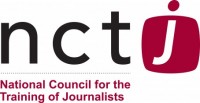The NCTJ delivers industry standard qualifications for pre-entry trainee journalists and professional qualifications for working journalists. NCTJ qualifications cover the multimedia skills required to work in print, online or broadcast journalism.
The NCTJ also offers one-day courses and bespoke media training for professionals looking to update their skills or refresh knowledge.
Contact details
National Council for the Training of Journalists
The New Granary
Station Road
Newport
Essex CB11 3PL
01799 544014
Follow us on Twitter, Facebook, Google+ and LinkedIn
QUALIFICATIONS
Advanced Apprenticeship in Journalism
The Level 3 Advanced Apprenticeship in Journalism is the first apprenticeship scheme for journalists developed by the NCTJ and employers in the media industry.
A journalism apprenticeship is aimed at those who want to develop a career in journalism by combining learning at college with on-the-job training.
It is a professional, vocational training scheme that doesn’t compromise on the exacting standards that are vital in modern newsrooms.
There was support from within the industry for the NCTJ to introduce apprenticeships to help editors recruit local people to their newsrooms and ensure recruits reflect the social and ethnic mix of their communities.
An apprenticeship provides an alternative but demanding route into a competitive industry and suits those who want to earn while they learn.
The pilot of the Advanced Level Apprenticeship in Journalism began in September 2013, with apprentices from Archant London; BBC radio; The Independent; i; the Kent Messenger Group and the London Evening Standard who studying one day a week at Lambeth College.
Diploma in Journalism
The NCTJ Diploma in Journalism equips trainee journalists with the knowledge and skills for professional entry level journalism.
The qualification has three under-pinning values:
- To focus on the vital skills of finding and telling stories accurately and to deadline
- To reflect that most journalists work in a multimedia environment and that ‘new’ and ‘traditional’ skills should be fully integrated and embedded in training and assessments
- To ensure the core essential skills are covered and assessed to a national standard but with flexibility to specialise
Students must complete seven modules to gain the qualification – five mandatory and two optional. Mandatory modules are: Reporting; Essential Media Law; Essential Public Affairs; Shorthand; and an E-Portfolio. Students select two options from: Broadcast Journalism; Business and Finance Journalism; Business of Magazines; Media Law – Court Reporting; Production Journalism; Sports Journalism; and Videojournalism for Online.
Click here for further information about this qualification.
The Diploma in Journalism is delivered at more than 40 centres around the UK – further education colleges, independent providers and universities. Different centres offer different specialist options and courses vary in length. Please click here for more information and to search courses.
The course is also available via distance learning; please click here for further information.
National Qualification in Journalism (NQJ)
The NQJ consists of four modules and is sat by trainee journalists with at least 18 months work experience. Candidates must pass Media Law and Practice, News Report, News Interview and complete an e-Logbook.
In order to be able to complete the NQJ, trainees must have achieved the gold standard (A-C plus 100wpm) in the Diploma in Journalism (or previous Certificate in Journalism). They are registered to complete the qualification by their employer.
Click here for further information about this qualification.
Click here to book refresher workshops for the NQJ.
MEDIA TRAINING
The NCTJ offers short courses for companies and individuals looking to improve their communications and media skills.
Bespoke courses can be delivered in-house at company offices or are available as part of a scheduled programme run at the NCTJ headquarters in Essex. Courses are generally one-day but can be tailored to customers’ requirements.
Subjects offered include: media law; grammar and proof-reading; news and feature writing; writing for the web; journalism skills for PR; interviewing skills; sub-editing; and videojournalism.
Click here for further information about the courses offered.





